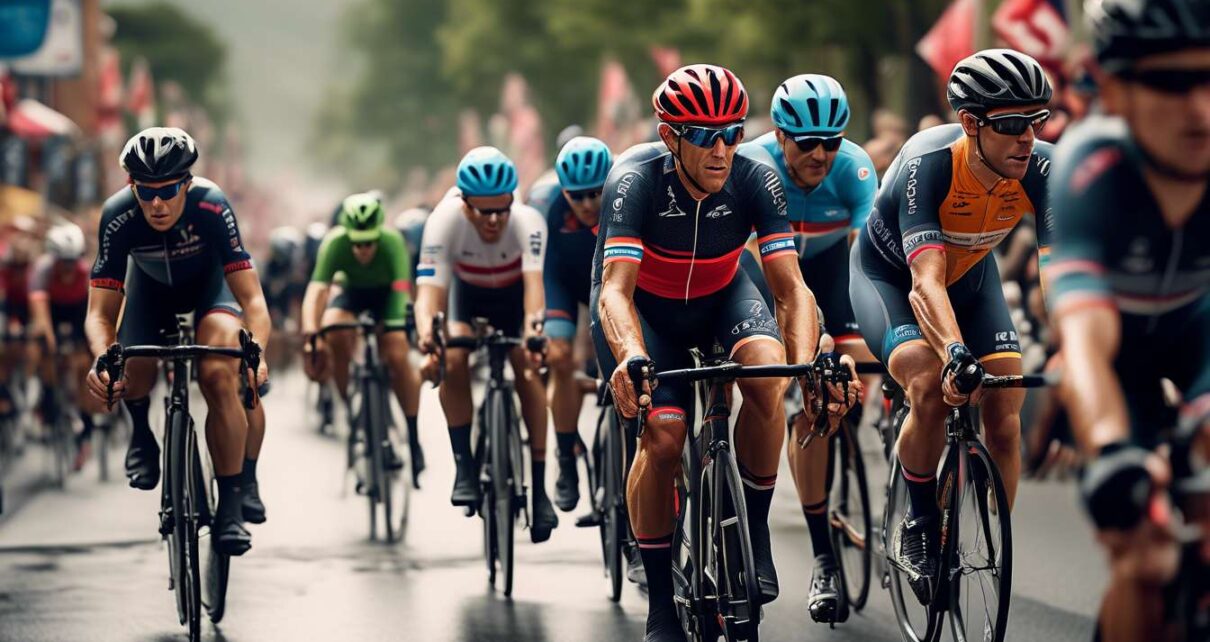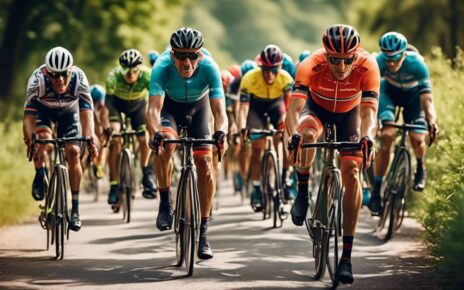As avid cycling enthusiasts, we find ourselves constantly inspired by the champions who have come before us. These athletes have not only conquered the most grueling of terrains but have also shaped the very strategies we aspire to emulate.
In exploring the world of cycling, we realize that the road to success is paved with lessons from past champions, each one offering invaluable insights and tactics. Together, we embark on a journey to understand these strategies, delving into the mindsets and decisions that propelled these athletes to greatness. By examining their approaches, we aim to enhance our own performance and deepen our appreciation for the sport.
In this article, we will uncover six critical lessons from cycling legends, lessons that are not only relevant to competitive racing but also to our everyday rides. Join us as we pedal through the wisdom of champions, eager to learn and grow as cyclists.
Six Critical Lessons from Cycling Legends:
-
Endurance and Perseverance: Champions teach us the importance of building stamina and pushing through challenging phases.
-
Strategic Planning: Successful cyclists carefully plan their races, understanding when to conserve energy and when to push forward.
-
Technical Skills: Mastering technical skills, such as cornering and bike handling, can make a significant difference in performance.
-
Mental Toughness: Maintaining focus and composure under pressure is crucial for overcoming obstacles and achieving success.
-
Adaptability: The ability to adapt to changing conditions, whether weather or competition, is vital in the dynamic world of cycling.
-
Teamwork and Support: Recognizing the role of team dynamics and support systems can enhance both individual and collective performance.
By embracing these lessons, we not only aim to improve our cycling capabilities but also to foster a deeper connection with the sport we love.
Endurance and Perseverance
In cycling, building endurance and persevering through fatigue are essential to achieving our goals.
Endurance is not solely about physical capacity; it encompasses mental resilience as well. By pushing through aches and discomfort, we understand that every mile strengthens our resolve. Cycling is more than a solitary pursuit; it is a collective journey where we uplift each other to reach new heights.
Our strategy is simple yet profound:
- Support one another.
- Adapt to the shifting demands of the road.
- Embrace every hurdle as an opportunity to grow.
Adaptability is crucial as it allows us to adjust our efforts and maintain our rhythm, even when faced with unexpected obstacles. Each ride offers learning opportunities, helping us refine our approach and become more resilient.
Together, we cultivate a community where perseverance is celebrated, and each member’s success is a testament to our shared endurance and spirit. By fostering a sense of unity and shared purpose, we can overcome the challenges that lie ahead.
Strategic Planning
In our pursuit of cycling excellence, we must craft a well-thought-out plan that anticipates challenges and maximizes our strengths.
Strategic planning isn’t just about having a roadmap; it’s about understanding how our endurance and adaptability can shape our journey. We know that every cyclist faces unpredictable elements, whether it’s weather conditions or unexpected competition. By embracing adaptability, we ensure that our strategy remains resilient and dynamic.
Let’s focus on how we can weave endurance into our strategy.
Endurance isn’t merely physical stamina; it’s the mental fortitude to persevere through difficult phases. When we plan strategically, we build on this endurance, allowing us to maintain momentum and make crucial adjustments on the fly. It’s not about sticking rigidly to a plan but rather about knowing when to pivot and adapt.
Together, as a community of cyclists, we can share insights and experiences, strengthening our collective strategy.
By learning from past champions, we create a path that invites us all to thrive and succeed.
Technical Skills Mastery
Mastering technical skills in cycling demands our attention and dedication, transforming us into more agile and confident riders. With each pedal stroke, we embrace the challenge of refining our techniques. This pursuit isn’t just about conquering steep climbs or navigating sharp turns; it’s about building endurance and developing a strategy that aligns with our strengths.
Key skills to focus on include:
- Balance
- Braking
- Cornering
These skills enhance our adaptability on diverse terrains.
Our shared journey requires us to constantly assess and adjust. We analyze our form, eager to find areas for improvement. The unity we feel in group rides reinforces this commitment; together, we encourage one another to push beyond our limits. By embracing technical mastery, we prepare ourselves for the unpredictable nature of cycling competitions.
Let’s not forget that our technical skills are the foundation of our cycling prowess. As we hone these abilities, we become part of a community that thrives on mutual growth and shared victories.
Mental Toughness
Developing mental toughness is crucial for overcoming challenges and achieving success in cycling. As a community of cyclists, we know that enduring long rides and pushing through pain isn’t just about physical strength. It’s about the mental fortitude that keeps us moving forward when the going gets tough.
Our shared experiences teach us that endurance isn’t merely about stamina; it’s about maintaining focus and determination even when obstacles arise.
Strategy plays a key role in building mental toughness. By setting clear goals and breaking them into achievable milestones, we foster resilience and a sense of achievement. This approach helps us stay motivated and persistent, embodying the true spirit of cycling camaraderie.
Adaptability also strengthens our mental toughness. Whether we’re facing unexpected weather changes or unplanned detours, our ability to adjust quickly without losing sight of our ultimate goal is what sets us apart.
Together, we cultivate a mindset that embraces challenges and empowers us to thrive.
Adaptability in Cycling
In cycling, we constantly adapt to ever-changing conditions, honing our skills to tackle whatever the road throws our way. Our collective endurance is not just about physical strength; it’s about the mental agility to adjust our strategy when circumstances shift. Whether we face unexpected weather or a sudden change in terrain, our adaptability keeps us united and resilient.
Together, we learn from past champions who’ve mastered the art of adjusting mid-race. Their stories remind us that a successful strategy is fluid, not fixed. We embrace this mindset, knowing that flexibility is key to overcoming challenges.
As a community, we share insights and experiences, building a network of support that empowers us to thrive in adversity.
In the realm of cycling, adaptability isn’t just a skill—it’s our shared commitment to growth and success. We’re not just cyclists; we’re a team, united by our passion and readiness to evolve with every turn of the wheel.
Embracing Team Dynamics
In cycling, team dynamics are crucial, with each member’s strengths contributing to collective success. Our strategy focuses on understanding and utilizing individual talents to enhance endurance and adaptability.
Together, we form a cohesive unit where each member plays a vital role:
- Setting the pace
- Shielding from the wind
- Leading the charge
We adapt to the ever-changing conditions of a race by leveraging our collective strengths to overcome challenges. When the road gets tough, it’s our unity that fuels our resilience. Seamless communication ensures everyone knows when to push harder or to conserve energy.
In this dynamic environment, we’re not just teammates; we’re a family sharing the same vision.
By embracing team dynamics, we become more than the sum of our parts. We support each other, celebrate victories together, and learn from setbacks. Our shared journey strengthens our bonds, driving us to achieve greatness.
Nutrition and Hydration Tips
Proper Nutrition and Hydration
Proper nutrition and hydration are vital components of our cycling success, ensuring we maintain energy and focus throughout the race. We need to embrace a strategy that fuels our endurance and supports adaptability, helping us tackle unexpected challenges.
Balanced Diet for Sustained Energy
Eating a balanced mix of carbohydrates, proteins, and fats allows us to sustain our energy levels.
- Before a race, consuming a light meal high in carbs and low in fats helps us store glycogen for the long haul.
Hydration and Quick Energy During the Ride
During the ride, we can’t underestimate the power of regular hydration and quick energy snacks.
- Sipping water or electrolyte drinks every 15-20 minutes keeps us hydrated.
- Energy gels or bars provide the quick carbs necessary to keep pushing forward.
Community Support and Adaptability
As a community of cyclists, sharing tips and supporting each other’s nutritional strategies fosters a sense of belonging. Let’s adapt our fueling tactics as needed, listening to our bodies and learning from each ride, ensuring our place in the cycling pack.
Recovery and Rest Importance
Rest and Recovery in Cycling
Rest and recovery are crucial parts of our training regimen, allowing our bodies to repair and strengthen after the demands of cycling. We know that pushing our limits is essential, but it’s the time we spend off the bike that truly builds our endurance and adaptability.
By strategically incorporating rest days into our schedule, we ensure that:
- Our muscles recover.
- Our energy reserves are replenished.
This preparation readies us for the challenges ahead.
Active Recovery Strategies
Our community of cyclists understands that recovery isn’t just about doing nothing; it’s an active strategy. We engage in gentle activities like:
- Yoga
- Light stretching
These activities keep us moving without overexerting our bodies. This adaptability in our routine helps:
- Prevent injuries
- Maintain our passion for cycling
Holistic Approach and Community
By valuing rest as much as training, we embrace a holistic approach. Our shared commitment to balancing effort with recovery:
- Strengthens our bonds
- Fosters a sense of belonging
Together, we’re not just cyclists; we’re champions of endurance and unity.
How can beginners start cycling without feeling overwhelmed by advanced strategies?
Starting cycling as a beginner can be daunting, especially with the plethora of advanced strategies available. The key is to keep it simple initially.
Here are some tips to get started:
-
Begin with short rides: Start with manageable distances to build confidence and comfort on the bike.
-
Focus on building endurance gradually: Increase your ride length and intensity at a comfortable pace over time.
-
Don’t be afraid to ask for help: Reach out to more experienced cyclists or local bike shops for advice and guidance.
-
Join a beginner-friendly cycling group: This can provide support, motivation, and a sense of community.
Remember, the goal is to enjoy the ride and improve at your own pace. Take it one pedal at a time.
What are some common mistakes new cyclists make that past champions have avoided?
When we first started cycling, we made some mistakes that past champions avoided.
Common Errors:
- Pushing too hard too soon: This often leads to burnout and injury.
- Neglecting proper bike fit: This causes discomfort and inefficiency.
- Forgetting to hydrate adequately: This negatively affects performance.
By learning from these missteps and focusing on gradual progress, we can improve our cycling skills and avoid common pitfalls.
How do cycling champions balance their training with other life commitments?
Balancing Training with Life Commitments
We balance our training with other life commitments by prioritizing and planning ahead. Understanding the importance of time management and setting realistic goals is crucial.
Key Strategies:
-
Prioritize and Plan Ahead:
- Set clear priorities for both training and personal commitments.
- Plan your schedule in advance to accommodate both aspects of your life.
-
Effective Time Management:
- Allocate specific time slots for training and other responsibilities.
- Use tools like calendars or apps to organize your tasks efficiently.
-
Set Realistic Goals:
- Establish achievable objectives for both training and life responsibilities.
- Regularly assess and adjust these goals to stay on track.
-
Communicate with Your Support System:
- Coordinate schedules with family and friends.
- Make adjustments when conflicts arise to maintain harmony.
-
Consistency and Dedication:
- Stay committed to your routine to maintain balance.
- Be flexible and adapt as necessary to unforeseen changes.
-
Integrate Cycling into Daily Routines:
- Find opportunities to cycle during commutes or errands.
- Look for ways to incorporate cycling into family or social activities.
By following these strategies, we can successfully fulfill our responsibilities outside of the sport while integrating cycling into our daily routines.
Conclusion
In conclusion, learning from the successes of past cycling champions can provide valuable insights to improve your own performance.
By focusing on the following key aspects, you can enhance your cycling experience and achieve your goals:
-
Endurance
-
Strategic Planning
-
Skills Mastery
-
Mental Toughness
-
Adaptability
-
Teamwork
-
Nutrition
-
Recovery
Remember, it’s not just about the physical aspect of cycling, but also the mental and strategic components that contribute to your overall success on the bike.
Keep pedaling towards greatness!




